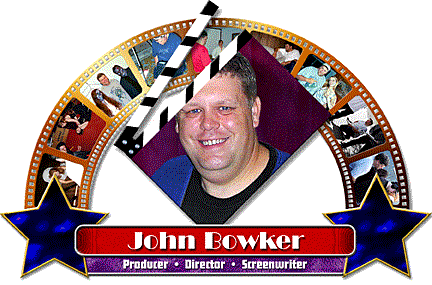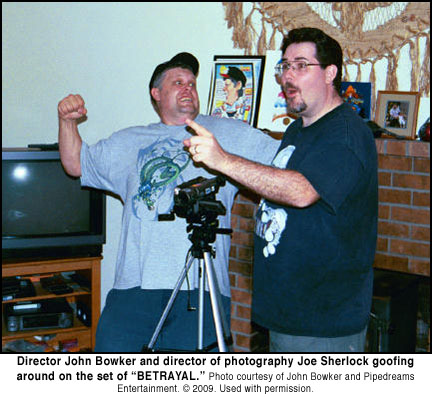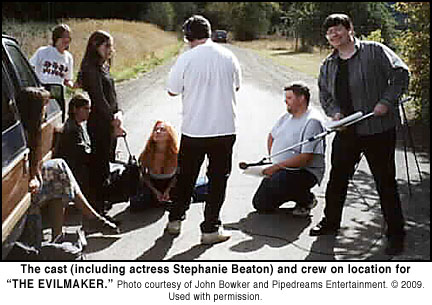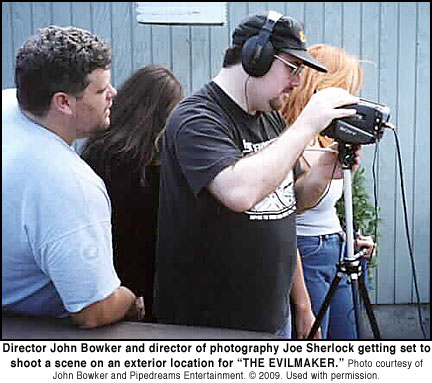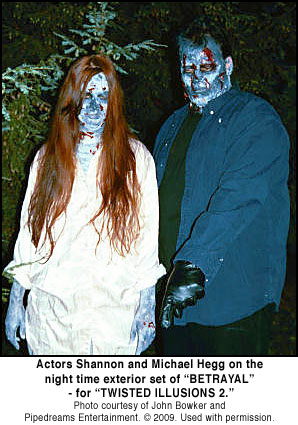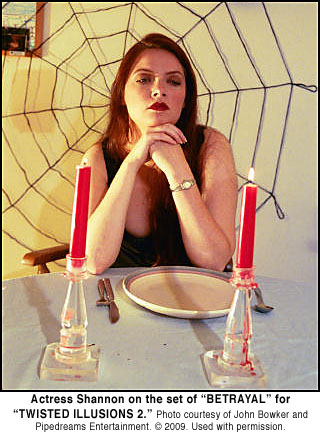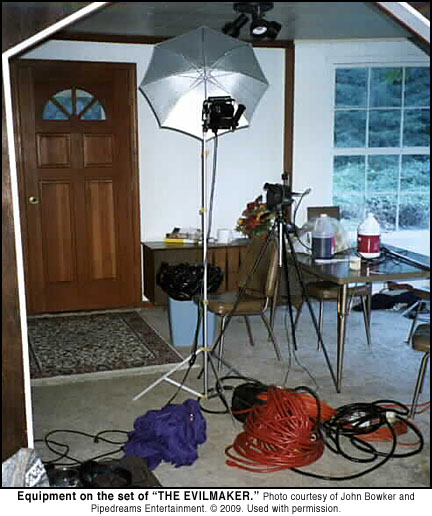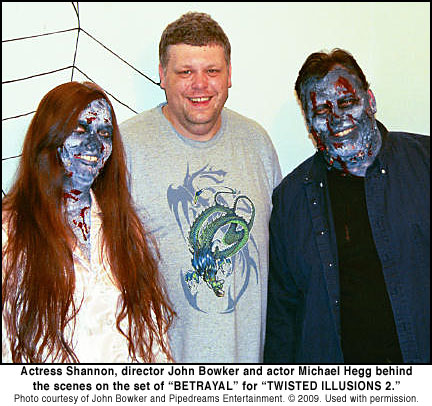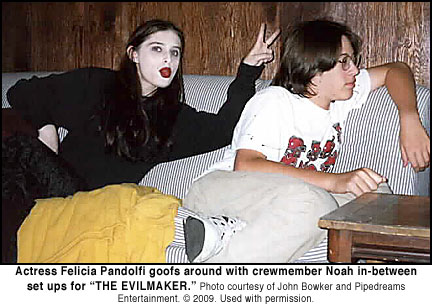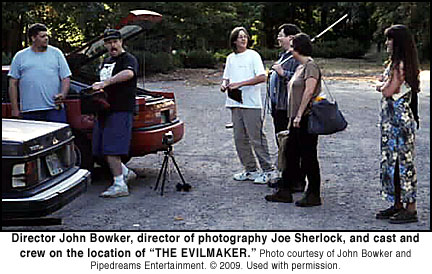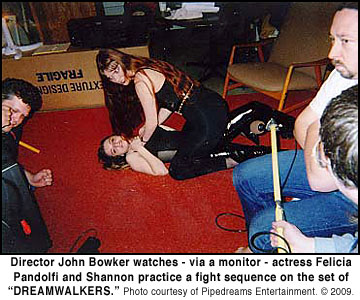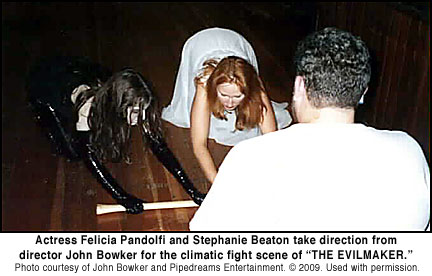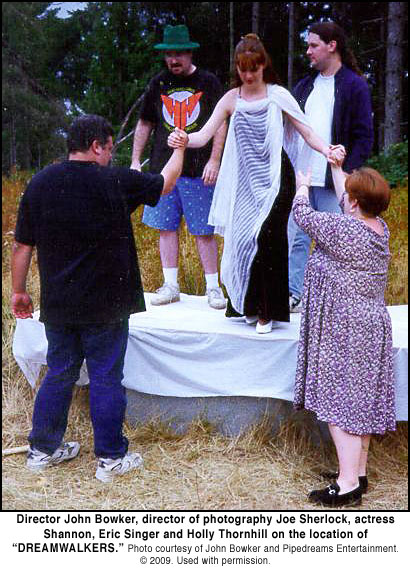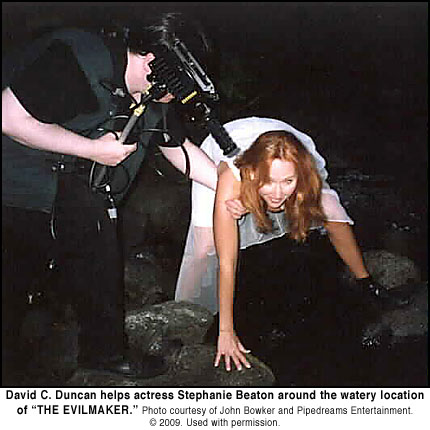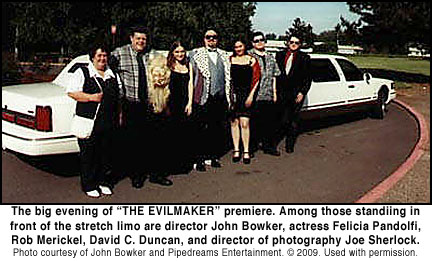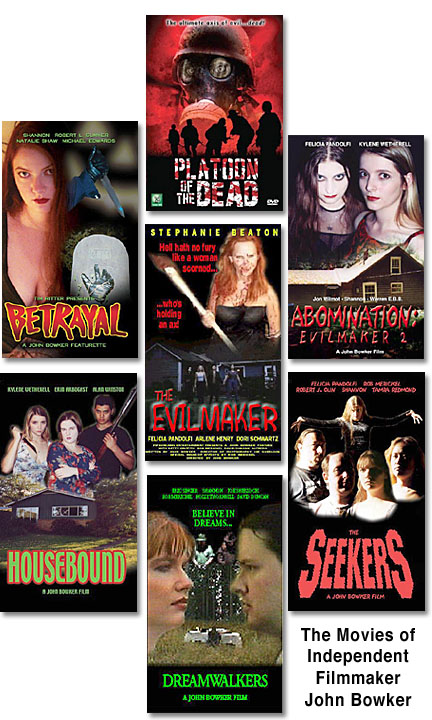Search
The John Bowker Interview
Summer June 2004 by Leanna Chamish and Robert Long II
Robert: How did you come up with the name Pipedream Productions?
John: Back when I was in junior high school, my teacher said I was living in a pipe dream, so the name stuck.
Robert: What was your first movie?
John: I did a movie before “Evilmaker,” it was my first movie, which is unreleasable. It was called “Dreamwalkers.” It was a two-camera deal, and unfortunately the scenes just do not match up. However, I am thinking of doing a remake, and I’ll put the original on the DVD as bonus material.
Leanna: I have a question, if you are not sensitive about your age. What age were you when you did your first feature? And what was the reaction from the people around you?
John: I was about 30 when I did my first film. Age was never a big deal until I came out to Los Angeles. I have been turned down for jobs because I write horror, and I have been turned down for writing jobs because of it. It’s hard to be able to prove yourself when someone isn’t willing to give you a chance because of your age.
Leanna: I was just thinking that at the age of 30, you’re grown up and people in your community might be asking “what the hell are you doing?”
John: At first it was more of a novelty. Once people had found out that I had done a movie they were like “Hey, I‘ll be a corpse in your next movie, I‘ll be a speed bump in it!” And at first my parents thought I was insane. It was funny because they were like “career, retirement, goals – why are you trying to do this horror stuff?” Then when they saw how well the first movie was received, what with the coverage in the news, the newspaper, and the premiere it became “my son makes movies.” Some people treated me like some kind of celebrity, which I thought was weird. So everybody supported me except for my parents at first (chuckles).
Leanna: And your day job at the time was?
John: My day job at the time was working clerk in a convenience store, selling beer and pop and snacks.
Robert: And then you got the movie-making bug and on the weekends it was bam bam bam, banging one out?
John: Exactly, I got the itch and then the whole ball started rolling.
Robert: So, you are a director as well as a screenwriter?
John: I love directing, but I have been writing since I was a kid; and I figured that no one was going to make my movies but me, so I directed them, and I discovered how much I love directing. I also enjoy producing.
Robert: How many different hats have you worn on a production?
John: Writer, producer, director, production coordinator, script supervisor, boom operator, grip, production assistant… you name it.
Robert: So the productions are really you, a couple of crew members, and the cast?
John: Yes – if you watch my movies you see all these names in the credits, and it is really just me, Joe, and Rob. The credits are full of fake names (chuckles).
Robert: What kind of pre-planning do you do for an upcoming film? Do you storyboard? Do you hold script meetings to get feedback on what will and will not work?
John: What I usually do is once I have a script and have it cast, I usually like to have 2-3 months for spec time and prep. I have four or five people that I trust profusely to send my script to and have them read it over. They will send it back to me and tell me if it is garbage or not. Sometimes we will sit around a table and read it out loud. They tell me what people will and will not say in a certain situation, what they did and did not get. This core of people will tell me what is doable, and if this is going to work or isn’t going to work. As to storyboarding, Joe and I definately do that, especially if there is an effects or fight scene. All of that is story-boarded, even if we do not follow it exactly; you have to be flexible. Joe and I will hold major meetings where we will sit there and draw it out. It helps that Joe is a graphic designer which makes the sketched scenes easier on us. I am not a tyrannical director. It‘s not “my way or the highway.” Sometimes someone will come up with a better shot than I did, and will will go that route. Basically we try to hash all this out before we get into production. Bottom line is we want to make the best movie possible.
Robert: Are your films self-financed, or do you have investors? If you have investors, what is your advice on how to obtain them? What, of all your projects, has had the largest budget? Which has had the smallest budget? Can you give me examples of where the money goes on a project? Can you give me cost reasons of why one film is more expensive than the other?
John: The largest budget was “Evilmaker” for $10,000, “Housebound” was around four thousand, and the smallest budget movie was on my first movie “Dreamwalkers” where the total budget was $300, and that was to feed the cast and crew. “Dreamwalkers” was more of discovery/experimental type of feature, which I plan to remake now that I know what I’m doing. The original will probably be included with it on the DVD. For “The Evilmaker” Betty Griffith, the lady that plays Serena’s mom supplied the money and the house and the property on which we shot the movie. We were sitting and I was showing her the script. She saw the light in my face and my enthusiasm and asked “How much do you need?” I replied “Well, $10,000 dollars…” and she wrote me out a check. Everything else has been self-financed with tax returns and money stashed away from paychecks. The reason I have done that is because I was afraid that if I did find someone to bankroll the money with major funding – say $100,000 or $200,000 – that I was going to lose creative control of my project. This has happened to other people I know as the investors have wanted majors changes to their stories. I’ve been doing this now for six years, so I am not jaded to the business yet. Making the movie I want to make is still important to me. These projects are still very much “my babies.” If I did go out and find financing for a project, I hate to say it but it would have to be project that I was not that attached to. Not that it wouldn’t be good and that it wouldn’t have higher production values, but my heart wouldn’t be totally into it. If the investors wanted to make changes that would be fine.
Leanna: Who comes up with the story and the script? Is it a collaborative effort? Do you allow outside contributors to submit a story outline or synopsis?
John: Usually I will come up with the stories and write the scripts. That when I send it out to those people I really trust to. They’ll get back to me with their opinions of what is wrong with it or ideas of what needs to be changed. I value everybody’s input. Sometimes we will rewrite dialoge on the spot as something just won’t work for an actor. I tell them that they can try it their way as long as it has the same meaning and idea out. They have the permission to say it how they would naturally phrase it, as long as it gets us from Point A to Point B. There are times of course where they do have to pretty much say it as written as it is an important plot point to the storyline.
Leanna: So if an actor or actress paraphrases it will sometimes be okay with you?
John: I don’t want people to come off sounding unnatural, although sometimes they still will. I can be watching one of my movies and think ” yeah, I should have phrased that differently.” Of course as the saying goes everyone has 20/20 hindsight at that point. Sometimes people have a hard time saying something that you have written. I am not necessarily a “word-for-word” type of person. I’ve known directors that are word-for-word and sometimes it just doesn’t work. If an actor is having trouble with dialoge, I will go up to them and tell them to try it their way, the way they would say it. As long as it gets the point across and stays within the focal point of the storyline.
Leanna: Are you ever concerned about someone submitting a script to you unsolicited and then turning around and accusing you for stealing their ideas?
John: You know, it’s one of those things that I have never really thought about, but I think I should. Most of the people that have sent me their ideas are just like me when I first started out. You can tell a lot of first time writers; fresh out of school. “Can you take a look at this and tell me what you think? Do you know where I can submit this?” That sort of thing. Friends of friends. People will send me scripts that they have written and I will read them to give them my opinion. At this point I still have so many stories in my head that I want to do that I really don’t accept other people’s scripts.
Robert: How do you go about holding auditions for a new project? How do you get the word out?
John: Well, I have my regulars. Some of them of course are close friends that wanted to be involved in a project. Some of them were friends of friends that I met. They would work a scene on a film and I would call them in for a future project. Some people would be found by advertising in the college newspapers. Others were found through a website I would set up. It would have the roles posted and what was required. That way you could weed out a lot of people because they know right away if it required nudity or whatever. They would call me up about a role and I would discuss it with them. Then I would meet them at a restaurant and do a personal interview and give them a cold reading right there. I had one guy casting a movie because he had no fear. He would go up to someone in a convenience store and ask if they wanted to be in a movie. He might tell them that the part involves showing some skin, and they thought it was great! Robert had no fear in doing that for me, getting new people.
Robert: So where do you hold your auditions?
John: I don’t go out and rent a hall or anything to do that. As I said, if I like their personality and they are outgoing when I’m talking to them on the phone, I’ll try to meet them in person at a restaurant or someplace public like a park and have them do a cold read.
Robert: Have you ever videotaped the cold read auditions?
John: No, it’s usually if I like their personality I will consider them, you know if they are outgoing. I don’t cast by committee. I do warn them about the major hours involved. I try to tell them about that upfront. Sure it is fun the first four hours, but then it goes on and on and they don’t realize the commitment involved.
Robert: You had run into that on “Evilmaker 2” with a woman in your cast.
John: She had taken as what I had said as being “a few hours.” It went all night, into the day. She was glad to get out of there! (laughs) I try to warn people up front that it is a lot of hard work, as you know.
Robert: Say someone can’t make it to the audition. Has anyone ever sent you a videotape for an audition, or would you consider using someone that does that?
John: I have had many people send me headshots; lots of headshots. Actually not necessarily any video tapes. I never ask for demo reels because if I am not actually casting I don’t want people spending their hard-earned money sending these things out if I am not in the position to cast at that time. I do keep everyone’s emails on file and will contact them if I have a part for them. I mean I am in the same boat when I send out screener tapes of the films to possible distributors. We are all starving artists and I know how much this stuff costs. I don’t feel right asking people to send DVDs with their work on it.
Leanna: Do you insist on trying to get in-person meetings because of the possibility of outdated video tapes or headshots?
John: Yes, that actually happened to a friend of mine. Steve Sessions was casting for a role and he got a headshot from this girl. When she came to the set she looked 25 years older than her headshot. He spent the money, flew her in, she had some credits, but these weird things happen. It is also good to meet them just to get to know their personality. As we are going to be pulling some major hours together we need to know we‘re going to get along!
Robert: What kind of payment method do you have set up for your performers and crew?
John: Sometimes the actors or actresses will take their payment in the form of say 20 to 30 DVDs. Maybe something like half of their fee in cash, and the rest in DVDs that they can sell for whatever they can get.
Robert: This is about your equipment, John, and maybe this would be a question better suited to asking your partner Joe Sherlock. Do you do any of the shooting yourself?
John: I call Joe (Sherlock) the human camera. We call his shots the “Joe Cam.” The reason I don’t shoot me own stuff is because Joe has a great eye and is a great cameraman and we’ve been great friends for 17 years so I let him take care of that. The reason I don’t do my own camera work is because I was born with spinal meningitis; my hands wouldn’t be steady enough so I would have to tripod every shot. I can’t do the hand-held stuff. I have always had Joe do the camera work for me. So yeah, the camera questions are best for Joe. The stuff that we shot the first couple of movies on were hi-8 cameras, not digital. The first couple of movies were edited on 3/4 decks. We started in the dinosaur age even though that was only a couple of years ago.
Leanna: Is Joe the one to talk about the editing? You had said that you were editing on 3/4 tape. Are you still doing so?
John: Well, I have a stand alone editing system called Sequel that is out by Applied Magic. You can get all the bells and whistles for it, effects and filter-wise but it will of course cost more. On or first movies we couldn’t do any fades, it was all straight cuts. Now the system I have can hold an entire movie in it and I can edit it all at once. Now I can mix and match and fade and many other things. Ironically, I find that now the editing can take me longer to do. I am a monster when it comes to editing. I’ll pull 18 to 20 hours at a time because I’m in love with it. The problem is that now I have too many options. It was almost easier in the early days to only be able to edit it one way. Now I’m like “I can move this here, or move it there. I can do slow motion, or black and white, or turn it blue.” So it can definitely take awhile to finish. I just love the medium. As a matter of fact I have edited one of my movies two different ways (Housebound) just because I could.
Leanna: So your editing tape formats have been 3/4 inch to…?
John: Yes, 3/4 inch. I’ve mastered out my other movies on S VHS. When they went to DVD they took the S VHS and pressed it to the DVD format. I don’t have a DVD system to press a master to. I believe they took the S VHS and dumped it to BetaCam for a master, and that was used when it was pressed to DVD. To be honest I am not totally clear on that, and how it was done.
Robert: Have you noticed any degradation of quality because of these transfers?
John: You mean like drop outs and such? Some, I mean here and there. But like I said at the time that is what we could afford. Over time you find yourself building up and getting better equipment so these things won’t happen. I myself haven’t gotten better equipment because I’m not the one shooting. Joe is, and he has the use of several different cameras.
Leanna: You have also shot on Hi-8?
John: Hi-8 is what we shot on. Actually everything I’ve done has been on Hi-8.
Leanna: Will your future projects be shot on digital or Hi-8?
John: The next one we shoot: Joe and his partner Michael have just spent a ton of money on a new camera that can give us the total film look without having to run a film effect over it. Best to ask Joe about that.
Robert: Do you find you have to have a pep talk with the cast and crew? You know, the do’s and don’t on the sets and locations?
John: Well, I have had to baby-sit. I’ve had to play peacemaker. Usually I try to use the same people behind the scenes. You know, everybody kind of knows what everybody’s job is. In the beginning it was kind of like a free-for-all. Nobody really had any assigned duties besides Joe running the camera and me directing. If somebody wasn’t holding the boom, someone else was holding the boom. Later on in the other productions I tried to have designated jobs; “Okay, you’ll be doing this and this, and you will be helping Joe with the lights. In -between the shots you need to help Joe move the equipment.” That’s how I would explain it to everyone. “I need you here to keep a running log of the shots. If it’ a keeper, if it’s a blooper…” You see, I didn’t have that on the first “Evilmaker” movie and when it came time to edit I had no running log of what was shot and it took forever. I would have to watch the tapes and make my own log and that would take so much time. Since then I know to have somebody there doing that job.
Robert: Besides your cast, what does your crew usually consist of? Obviously you are not running around with a grip truck, so how do you get your equipment, cast, and crew from point A to point B?
John: Well I’ve been lucky that Rob, my makeup guy has vans. So usually Rob’s vans and get all our cars together and stuff all the trunks and all the seats with the lighting, cords, and equipment. That’s how we transport it. As to crew there is of course Joe on camera, Rob doing makeup. Sometimes we have been so short-handed that our boom has literally been a mike stand. People would commit and would come out and try it for a day or night and they will see how hard it is; comes next day and you’re using a substitute for them.
Robert: Because they’re gone.
John: Well, you know it’s like they have this misconception of what it would be like: they meet you at a party, find out that you make movies, and they think being in one is going to be glamorous. 3:00AM in the morning, covered in mud in the pouring rain and they are like “I’m never doing this ever again!” As I said, I try to warn them ahead of time. Basically I try to have four people on set to do about 10 different jobs. Everyone’s wearing a lot of hats. The main positions are directing, camera, and makeup. Everything else is kind of assigned as needed, like helping Joe. If Rob doesn’t have to do makeup for a half an hour I might have him run errands for things we need.
Robert: Do you have anyone on set to do the special effects or physical effects on your locations?
John: Yes, that would be Rob. He’s both makeup and effects.
Robert: How is costuming handled on your projects?
John: Usually everybody supplies their own costuming, unless it’s something special that they don’t have, or a shirt or something they don’t want to get ruined. I will then tell them to go buy a duplicate of it and have them give me the receipt. The next time I get paid I pay the people back. Sometimes items are borrowed. Take for example Felicia, who played Rachel in “Evilmaker.” All that Goth clothing belonged to her best friend. They are about the same size so it worked well.
Robert: Do you have anyone on set keeping track of what people are wearing from scene-to-scene, day-to-day?
John: Um… Continuity? Oh, Good Lord.… (chuckles) Rob would take Polaroids of everyone in costume and full makeup; front, side, and back – photos of every little detail. He would peg them up and look them over, seeing what person had to wear and what they had to look like for that day on the set.
Robert: You have worked on locations rather than sets. Advantages and disadvantages.
John: For locations provided by homeowners, I have a standard contract for them to sign. Basically it states that I can film on their property from this day to this day. If anything is broken or ruined I am libel for it. I have them sign this basic contract. In Oregon everybody is so easy going about it. The Pros of locations and to stay out on locations is that you save a massive amount of money on hotel bills. The Cons have been that usually we have been filming is such a remote area that we are literally 40 minutes from the nearest town. This makes it difficult to get food or other things we might need at a moment’s notice. Another bad part of staying out on a location is that, even if people have their own separate rooms, they’re seeing the same people for 10 days, day in and day out. This can lead to stress and getting jaded; sometimes I will flip for a hotel for the night for people, so they can separate. They can relax and do their own thing, as long as they are back on the set at 5AM in the morning! (chuckles) I’ve done this a couple times. People start getting wacked out over time and you have to put a stop to it quick. I have pulled the plug a few times and told everybody to just knock off early and we will regroup in the morning. It’s just not worth it. I mean these people aren’t getting paid millions of dollars so you have to take care of them.
Robert: Craft Services
John: Well before I shoot I get everybody together to find out if anyone is allergic to certain types of food, or perhaps are on a diet. I don’t want to get out there on location and have somebody say “I can’t eat this.” So I will get a list of what foods people are allergic to, or that they can and cannot eat. Then I try to get all the acceptable food together out on location in coolers. The range of food usually runs the whole gambit. Actually for “Housebound” we shot at (actress) Kylene’s house, and I gave her $300 for the catering of the five day shoot there. She wanted to do the cooking for us. I told her what ever she didn’t spend of the $300 she could keep. Kylene ended up spending only about $150, but we ate like kings. I don’t know how she did it. I mean we had seven course dinners: a full turkey, vegetables, mashed potatoes, full Mexican dinners… I mean she went
all out. She picked blueberries and made everybody pies. It was just awesome, just incredible. It was the best!
Robert: (chuckling) That’s stretching a dollar!
John: She gave me all the receipts for the taxes and expenses. She pocketed the $150, but she treated us like kings; I couldn’t believe it.
Robert: As far as on other locations and sets go, you probably run the full gambit from snacks to fresh fruit –
John: Right. Muffins, fruit, cereal, milk, orange juice…
Robert: Obviously caffeine like coffee, sodas, also water…
John: Yup. I made the mistake while shooting the first “Evilmaker”… I forgot to get a coffee machine. I learned my lesson on that. Depending on how far out on location I’ll spring for pizzas or Subway™ sandwiches.
Robert: So basically what you are saying is that they are taken care of.
John: Oh yeah. There was only one time that I felt like a total idiot. Someone had bailed out on the shoot, so I was going to be the one getting the food that day. We were going to be out on location which was at least an hour away from civilization, so I asked everybody what the wanted for lunch and everybody was like “Oh, sandwiches and chips and pop is fine.” So we get out there on location and… I’d forgotten the bread.
Robert: (laughing) You were getting them on Atkins early!
John: (chuckling) Yeah, I was getting on Atkins early. To this day I still get a rise out of it: on Christmas two years ago everybody got me loaves of bread. I mean, we had all the other food there for them to eat like the re-fried potatoes and stuff. When I got home, there was the bread, sitting on the counter. I got such ribbing from that, I made sure never to make that mistake again!
Robert: Now we were talking about your friend Rob that had done the special effects and special effects makeup on your films. Now when it comes to low budget films and doing the makeup on the actors, and it’s not going to be special effects makeup. Have you ever employed someone to do glamor makeup for your performers. Is it just up to the actors themselves to do it?
John: Actually Rob does both: the glamor, the basic, and the special effects makeup. I have had actresses that prefer to do their own makeup. I tell them that we do have a makeup guy if they want to use him. As a matter of fact one night on the “Evilmaker” we got done early, and Rob just wanted to play around and practice; Alicia stuck around and let him use her face over and over in different ways so he could practice.
Robert: Have you ever had to deal with insurance or completion bonds? If not, have you ever wished that you had it for your shoot?
John: No, it’s been total guerrilla film making. With every shoot you’re thinking “Man, I hope nobody slips down these stairs.” On every shoot you realize that you just don’t have the $900 for a million dollar bond. Everybody just has to be really careful. I do know somebody on another shoot that did fall down some stairs and broke her leg. The guy’s lucky she didn’t sue. It was a good thing they were really close friends, you know.
Robert: Wow! Did he help her out financially?
John: Oh yeah, he certainly did. When I write scripts sometime I’ll get these grandiose ideas and I’ll start to think about it and it’s like “Wait a minute here! Let’ back up some. We don’t want to do that.” In the “Evilmaker” I had originally written it to where the actress goes across the roof and climb down a tree. We got out there on location and there was no way I was going to have her do this! So she slinked down a set of stairs instead.
Robert: Out of town actors, putting them up.
John: It’s usually a communal thing. out there on location. So far everybody has been really great about staying out there on location. I ask them ahead of time if they mind staying out on location; I’ve never had any problems. It’s like I said though; if I see people getting too stressed I will disperse them. Give them a night to do whatever they want. If somebody’s from out of town, they won’t have any way to get around. I’ll take them out to do whatever they want; if they want to go to a movie I’ll take them to a movie.
Robert: Dealing with performers different personalities and friction on the set.
John: Well, each “episode” needs to be dealt with in a different way based on the personalities. I had one guy who is a stage actor. In theater it is sometimes like a community type of group; at least the theater he was involved in was like that. As I said before, I don’t mind taking suggestions, but not time after time after every shot. He got a some of the other actors riled up because I told him I needed his performance to be a certain way… and he didn’t like that. He tried to get these actresses on his side to kind of pound it into me what he wanted to do. Eventually I had to lay down the law and told them sorry, but that’s the way it has to be. There’s been conflicting personalities like a couple of the actors on one of my movies. They were supposed to be husband an wife, but that actress didn’t want to work with that actor. There had been some friction between them in the past. I had to pull the actor – who is a friend of mine – aside. I had to explain that to him without him getting ticked off at me, the actress, or simply walking off the set. He had taken 10 days off of work to be involved in this movie. The actress would not budge on this and we had shot half of the movie; I felt completely bullied but there was nothing I could do and at that point I had no choice. Thank God the actor is a good friend and understood this. We ended up filling the role with someone else, but the initial actor did stay on to help out. Playing peace keeper is all about the personalities and how you handle it. Sometimes you have to lay down the law, sometimes you can negotiate yourself through these things. It just all depends on the situation.
Robert: So mentally and emotionally, even as the team leader of the project you need to be pretty flexible to keep peace on the set.
John: Right. There have been times after a whole day’s shoot I feel like I really didn’t direct; I just played mediator all day. Hopefully within all that you got a few things shot. Most of the day was spent calming this person down because so-and-so ticked someone off.
Robert: In the future you kind of know who to work with.
John: Oh yeah, you learn who gets along with who, and who doesn’t get along. That way you can break up your shooting days and work with them separately. It’s a learning process.
Robert: Nudity has been in several of your movies.
John: Four out of the five movies I’ve done have nudity in them; “Dreamwalkers” did not. Comfort on the set for the actors and actresses doing nudity. Well, first of all, some of them are just friends that I have known for years, so I just flat out ask them if they will do it. The website I put up really helped when casting people for those parts. Those that didn’t have a problem with doing nudity would respond. My next step has been to have a Bar-B-Que where everybody gets together and meets one another. They would mingle, and later I would pull aside the actresses that were going to do the nudity. I then ask them if there is anybody that they don’t feel comfortable with. They would then tell me yes or no; if yes they would tell me who they didn’t want there for those scenes. That’s how I work it because ultimately comfort is a big thing to me; if the actors and actresses aren’t comfortable that’s going to come across on the screen. So far no one has had any problem with me coming up to them and telling them that that it will be a “closed set.” That’s how you say it – it will be a “closed set” and necessity people only, and they will have to hang out elsewhere for a little while.
Robert: Well that’s right. This isn’t a bunch of frat boys hanging out, this is trying to get the job done as professionally as possible.
John: I keep it to a bare minimum crew. Usually it is just me, Joe, and Rob. If there is a female on the crew, sometimes the actress will request her to be there as well.
Robert: For the comfort factor as well as a chaperone. Leanna has been the chaperone several times.
John: Really!
Leanna: I’ve chaperoned all the nude scenes for Timewarp Films.
John: That’s great! Sometimes having another female there makes all the difference in the world.
Robert: I think it helps the performers feel like it isn’t a roomful of ogling men. Someone else is there as safety.
John: It’s completely understandable. To be honest, I am not comfortable shooting those parts, but have felt that it is needed because of the genre. I let the actresses know that I am not totally comfortable shooting it… but because of the type of movie it is, it’s necessary to have it in there for distribution to pick it up. I had sent one movie to a distributor, and he told me that he wanted a nude scene or sex scene once every five to ten minutes. This was to get it on pay-per-view… well I’m not going to do that. Everybody usually understands the genre. I know people who will do it, and people who won’t, and I’ll write their characters up accordingly. You just try to make it as comfortable and fast as possible. We’ll rehearse with the clothes on, and then shoot it nude.
Robert: Do any of them come with their own robes that they can throw on? Do you supply those for in-between the scenes?
John: Yeah, they bring robes. However some of them get so comfortable with it that they just topless. I’ll offer them something to cover up with, but they decline. Some are just natural exhibitionists I guess.
Leanna: Do you ever verbally or contractually lay out how much of the women’s body will show? Say for example that sometimes more of the body will get videotaped. How does she know that you won’t show the crotch when you said you won’t show it. All you were supposed to get is boobs, but you ended up with “crotch shots” on the tape as well.
John: Well, one “Evilmaker” during the axe scene the actress’ boob fell out by total accident. That wasn’t supposed to end up on tape, but she was fine with it and said that was a “freebie.” But, usually I do have it contracted to be just topless. Joe is very good about shooting it and getting it cut off where it’s supposed to be. He gets just the right angles and is very good about not showing more than what was contracted. We have an actress that has no problem doing topless but not bottomless. Hey, I have no problems with that whatsoever. I’ve had an actress/model say that she’d do full frontal; she didn’t care.
So I try to contract it to where it is say three shots topless. What’s funny is even if it gets set in the contract, you have to shoot that footage first; somtimes the further people get into a shoot, the more nervous they get about it. If you get it out of the way fast then the rest of the time will be more comfortable for them.
Robert: Because it’s out of the way.
John: Right, it’s out of the way. Otherwise they start sweating it, and no matter how much you try to comfort them they know it’s coming up. So the first or second day of the project I try to get those scenes out of the way. That way they can have a good time for the rest of the shoot. I don’t want people to suffer and worry about it.
Robert: Leanna had an excellent point as the performers have no idea how much the camera is seeing. If they have agreed to three breast shots, and you shoot more and show more than that in the final product it could come back to haunt you.
John: Oh yeah, definately. Joe is very meticulous about setting the shot up right. If anything ends up on tape that is not supposed and I see it during playback? We will shoot it again.
Leanna: We’ve accidently gotten some very explicit shots on the Timewarp and people just trust Don (Dohler) and Joe (Ripple) not to use them. Personally I think it’s better if it is written down.
John: Absolutely. It’s all contracted out.
Robert: Scheduling the cast and crew. How do you go about it?
John: First I call everybody and I get everybody’s schedule for the time we’re going to shoot. Two of my movies I have shot straight through, from beginning to end. Those were “Evilmaker” and “Housebound.” All the others were on weekends. I’ll get everybody’s schedule together and see who is free and on what shooting days. That’s how I get the schedule together. Sometimes there will be three weeks where we don’t shoot because nobody’s schedule meshes. Continuity becomes a living nightmare then. But, you’re not paying these people tons of money so you have to work with it. If you have a cast of ten people that’s a lot of work around. That includes the crew as well.
A couple times people have come to me and told me to schedule them in; if they have to take the day off from work they will.
Robert: Continuity have you ever dealt with people looking different as the film shoot progresses?
John: Actually everybody’s been really good about keeping the same hair length and color. Alot of these people are good friends of mine and they understand that. However in my first movie “Dreamwalkers” we had an actress who started out with really long hair at the beginning of the movie. She was also supposed to be seen at the end of the movie. Well so much time had past since the beginning of the shoot that she kinda forgot and got her hair cut. So… at the end of the movie she’s wearing a hat. She called me up and told me this, and we had to find away around this. I could have had our makeup man Rob to make a wig, but a hat turned out to be simpler. That’s the only time it’s happened.
Robert: What was interesting on Timewarp Films movie “Stakes” is that the shoot started in early summer, and the character that Leanna played had hair JUST a little shorter than the next scene she appeared in which was shot in the Fall. So it happens. (sound of Leanna smacking Robert in the head for bringing that up).
Robert: Now the next question may be a little sensitive so you don’t have to answer it if you don’t want to; have you ever been on a location and have something “go missing” because unbeknown to you a cast or crew member was a secret kleptomaniac?
John: The only time I had something missing was when a girl on the shoot ended missing an Oregon State University sweatshirt. Nobody could find it. That’s the only thing that has ever turned up missing. We are usually really good when we are on other people’s property. I work with people I know and we’ve been friends for so long that I know I can trust them. When the girl called me to tell me that she couldn’t find the sweatshirt, I sent emails out to everybody; nobody could remember seeing it… so there you go.
Robert: Murphy’s Law:
John: Ooooh… how much time do you have? (chuckles) Okay, let’s see… in “Abomination” the scene with the two Goth girls when they are holding the seance to bring Rachel’s spirit back up? There was originally supposed to be three. We had it all worked out, and then I get a call four hours before we started shooting. The girl said ” Well I’m going to a rave.” I told her that we were shooting in four hours. “Can we shoot it tomorrow?” she asked. Well, of course the answer to that was no; so in four hours I rewrote that entire scene from three girls done to two. There was no way I was going to push it back; I had people coming in from out of town so there was just no way I was going to do that.
Robert: Was this girl a friend of yours?
John: Actually no. She was one of those that I had found through the newspaper ad. I thought she was reliable but sometimes that’s how things go.
Robert: It’s like people don’t realize the responsibility of making a film. All the time and energy it takes.
John: It’s fun for them but for the rest of us who are working our butts off…
Robert: This is serious business.
John: Exactly. In another movie, my first movie (Dreamwalkers) it had two teenage girls in it. They were 15 years old., and had their parents there on the set. They had like a pizza party that they had gone to, and they had the giggles and just couldn’t calm down. We tried to have them run around the house to burn off some of that energy with no success. It was reaching about 1:00AM and we still had seven pages to shoot of their scene. It was obvious that things were not going to work the way we’d planned, and we didn’t want to bring the girls back for another night. So I took Joe into the back room and basically it was another rewrite kind of thing. I took the seven pages and combined them down to one. We got it shot in about an hour. There are just like 1,000s of these type of stories.
Robert: Nature calls
John: You know what’s really funny is that every place that I’ve shot at has had a bathroom.
Robert: Really?
John: Oh yeah. I mean not only have we made sure we had bathrooms nearby, but also electrical outlets. We can make an area look desolate just by the way we shoot it, but in reality there’s a house next door. I mean we were out in the boonies you know, but we were never that far away to where people couldn’t use the restroom or take a shower and things like that. Back in Oregon I know all these people with all this land; you can be shooting at some big old house and right behind it is nothing but forest. You just get enough extension cords out there to set up the lights and you’re ready to go.
Robert: It must have been a little trickier when you were shooting at the culvert. I bet you had to make sure people had “taken care of business” before climbing down to that remote location.
John: Oh yeah, once people’s feet hit that cold water (chuckles). But seriously, that location was only about 30 feet from the house.
Robert: Really?
John: Yes, really only 30 to 40 feet away. The house was right there, then the road, then the culvert. It’s all in how you shoot at the location to make it look that isolated.
Robert: So basically because of the way you’ve set up you’ve never run into that problem.
John: Never had a problem… oh you were looking for horror stories about that! (jokingly) Well, we had newspapers… (laughs)
Robert: No, actually that was a very good answer because basically you were prepared.
Robert: Do you shoot over weekends or shoot straight through, taking time off to do so?
John: I actually prefer to shoot straight through. Once I get in the zone of the project, I don’t like to break away every couple weeks to regroup. I would rather shoot all the way through – be totally exhausted, totally sick of it, but able to say “Yes, it‘s done!” Straight through is my preference but it doesn’t always work out that way.
Robert: So it’s been good when you have a ten day shoot. Everybody’s there and ready to go.
John: It gets exhausting, but a lot of things are easier; the continuity, the cast being together the whole duration, etc. But frankly I love the feeling of the last shot; It’s done! Let’s go do something else! When it’s spread over a long period of time, about half way through I start to suffer from burnout. You’ve shot for four months of weekends and you have another four months to go. You say to yourself ‘This is taking so freaking long!’ Most professional movies are shot over a period of time, be they are only getting a few shots a day. We’re trying to get 10 to 15 shots a day. It’s
hard to keep your energy up when things keep getting postponed; people not being able to show up, family problems, people flaking on you, etc. If you can get people to commit to a decent chunk of days, that is less time for them to lose interest. If they are not professional performers trained to do this, they are going to lose interest over time. If you shoot consecutively, they are locked in, focused, and can see the light at the end of the tunnel.
Robert: Soundtracks and sound effects.
John: Joe and I have spent many hours in his garage creating effects: doors opening, things squishing, ripping. Joe has a keyboard and we have sampled sound and things. We have sat down with it to create many sound effects. Music-wise, the majority of my movies I use stock music. “Abomination” had a score written for it. I love music that was written for the movie as it feels better, but you just can’t always afford that. I was blessed that the Steve Sessions, who wrote it, had seen the first ‘Evilmaker. ” He came up to me and said that he wanted to write the score for the sequel, and he did it for free. So that was a big favor. He wants me to come out and help him with one of his features, and I’ll be there. There’s a lot of favor-pulling. The guy that did my special effects in a couple of my movies has a hard time writing. Well, I’m going to write him a couple of scripts in exchange for the effects.
Robert: Stock library effects
John: Oh yeah, between Joe and myself we have like 11 CDs of car screeches, crickets – so yeah, we’ve used stock sound effects.
Robert: Name brand?
John: Actually a lot of the stock sound CDs come out around Halloween, and those are the ones we pick up. The title is like “100 Sound Effects.” Everything from pig squeals to airplanes. There is a downside of using stock sound effects or music. I watched a movie the other day that had music in it that was used in one of my movies. What are you going to do? You use what you can afford. Most people at the time wanted three to four thousand dollars to do the music, and that’s a huge chunk of our small budget! Thank you, but I will go out and buy a $30 CD that I can use over and over.
Robert: Distribution:
John: Out of the ones I have worked with, do I prefer any distributor over another? No, at this point in time I probably won’t work with any of them again. There have been a lot of poor experiences. One distributor, I have to give them credit, did get me some overseas sales and I got paid for that. However it was nowhere near though what my investor wanted to make for the movie. I mean, thank God she’s a good person and told me not to worry about it. Let’s face it though; no one DOESN’T worry about $10,000! So when ever I get extra money from the sales of the movie I make sure to get it to her. Distributor hell One went bankrupt. Two of my movies went through a guy that did absolutely no advertising but promised that they would get into Best Buy and into Fry’s and all these other places. He had contracts with all these stores, but he ticked everybody off and they sent everything back. So… “Housebound is still $4,000 in the hole for the replication bill; “Seekers” is still about $2,500 in the hole. Part of this is because of the distributor. Things change, and the market for films goes up and down… but in reality it was about how things were contracted. He had written the contract to have a double meaning; the way I had interpreted the contract is that no matter how far in the hole it was – if he sold a copy I would get X amount for each of copy sold. It was kind of like it was divided into thirds. That is the agreement I thought I was signing. However he turns around and keeps everything and was applying it towards the bill. Here I thought I was going to get my $2 to $3 per DVD; I forget exactly how the conversation went, but essentially the contract had been written to where he could do that, and I misunderstood. I mean I don’t hate the guy – I understand he’s that far in the hole. I talked to the guy that did the authoring for him and the distributor hasn’t paid him a dime. So this is just a total mess. I have a friend that knows the guy who has distributed two of my movies, and he’s going to try to get them back for me next year.
Robert: Will you have a contract lawyer look over the next contract before you sign it?
John: Oh yes, very much so. They can point out to me where “The distributor is saying this, but they really mean that.” I mean, all these mess ups may have been my fault because I trusted what was in front of me. It’s so hard to know who’s honest out there. That’s why I’m thinking that the next one I do I’m taking to AFM and getting the money up front, and you can do what you want with it. In the world of independent movies, getting money up front is hard, almost impossible! I know Fred Olan Ray fronts up some money, but it is usually only a couple thousand dollars. That’s why I would try to take the film to markets and sell it outright. I should have done that in the first place. If I get my other movies back next year, I will probably hold on to them for quite some time and then try to re-release them later as like special editions.
Apparently this guy has screwed over a lot of other people. Nobody’s happy but they can’t afford to do anything about it. Meanwhile he just bought a house…
Robert: Do you hold premieres? What about wrap parties?
John: (chuckles) Oh yeah, all-nighters. Usually when I do a premiere I invite people and I try to find a place that has a projection unit. The people involved invite their friends and family to see it, plus I open it to the public. Sometimes 30-40 more people will show up because they read about it in the newspaper or saw it on the news. I send out press releases to the news stations. Of course, this is in Oregon. Out here in LA you wouldn’t get any type of coverage at all.
Afterward everybody would get together at the designated house for cake and a party. At one of the wrap parties a friend of mine worked at the local McDonalds. They had gotten rid of the children’s ball pin area at the restaurant. So, my friend got all the balls from it and we made a big ol’ ball pin and were playing in that all night.
Robert: Wow! That had to have been fun!
John: Yeah, that’s like the icing on the cake, the fun part of making the movies. Everybody gets to release after the shoot.
Robert: has there ever been any dangerous stunts on your features?
John: Not necessarily dangerous, but people have been freezing cold on our shoots! (laughs) There was a scene in “The Seekers” that takes place in a warehouse. Well, there was a hailstorm going on outside. One actress had to be chained to a wall, in her underwear. We had all of these mini heaters but were still concerned about frostbite. In the first “Evilmaker” we had gas lanterns and the lead actress burned her arm on it. She stood up with it and it touched her arm and she got zapped. We took care of her though. On the next film we decided to use electric lanterns instead.
As cool as it would be to have people hopping around, doing this, that and the other thing you can’t ask people to do that. Therefore I don’t write it into the scripts. The most dangerous thing I’ve encountered was bad weather. Out on location or on a set; it starts raining and all of a sudden everybody’s makeup is running.
Robert: Is there anything you’d like to add to tell the people that want to get into this industry?
John: Do it for yourself. Don’t do it with the aspirations of making tons of money; do it for the love of doing it. Sure, it would be nice to have the money, but I can sit back and say ” I’ve made 5 movies.” There’s a lot of people that will talk about it all the time, but that‘s all it is; talk. The feeling of being able to take nothing and creating something is one of the greatest feelings in the world. I always try to tell people to do it for themselves; don’t do it with the expectations of making tons of money. If it happens – awesome! But don’t go into it with that attitude.
Director/screenwriter John Bowker was born on January 12th, 1968 in Martinez, California. When he was just two, his parents moved back to Oregon where he was raised in the small town of Corvallis. At a very young age, he knew what he wanted to do. Make movies.
When he was in High School, he acquired a VHS camera and proceeded to make a series of small movies in which he called “Bowker Theater.” With titles like “THE HOSE,” “TEXAS MALONE, AGENT 000,” “LOOKING FOR KITTY,” “NIGHT OF THE LIVING FURNITURE” among others. He collaborated on these with his long time friends Joe Sherlock and Rob Merickel. He also helped Joe on his epic first movie, STAR CHASERS.”
Growing up, science fiction and horror were the movies of choice for John. After High School, he moved away from home and started to do the “life” thing, but never lost his passion or desire to make movies. While home on vacation, Joe let him see his latest flick called “DIMENSION OF BLOOD” and immediately wanted to get back into the swing of things. Over the next couple of years, he starred in Sherlock’s features, such as “MONSTER IN THE GARAGE,” “MARS VS. THE POPE,” “CRIMSON HEATHER” to name a few.
And finally in 1997, he jumped back into making movies with both feet with his first full length feature, “DREAMWALKERS” and hasn’t looked back since. From the years 1997 to the present, he has written and directed five features, directed three 30 minute shorts and written two scripts for other people, with no signs of slowing down or stopping. He’s worked in Hollywood, CA, and now resides in Oregon.
FILMOGRAPHY:
WRITER AND DIRECTOR:
2009: PLATOON OF THE DEAD Writer and Director
2004: TWISTED ILLUSIONS 2 (Betrayal Segment) Writer and Director
2004: THE BRINK Co-Writer
2003: HOUSEBOUND Writer and Director
2002: ABOMINATION: THE EVILMAKER II Writer and Director
2002: WEREWOLF TALES (The Bite segment) Director
2001: THE SEEKERS Writer and Director
2001: THE ALIEN CONSPIRACY: BEYOND THE LOST WORLD (The Camping Trip segment) Director
2000: THE EVILMAKER Writer and Director
1997: DREAMWALKERS Writer and DirectorMisc. Notes:
RL: Well, there is the skin you were talking about. What, we are seven minutes into it?
RL: So that’s the entrance to hell?
JB: You can hear his accent. I really didn’t have a problem with it.
JB: Yeah, that was a fake axe. Rob had stayed up the night before
JB: This may sound sound kind of sick but the best blood sprays you get is just by getting a huge amount of fake blood in your mouth and just letting loose on your actors, spraying them with the blood.
JB: There’s a lot of schlock out there. It’s like Don Dohler’s and Joe Ripple’s movies; I love their movies but I’m sure they run into the same situations of people coming up to them to say
